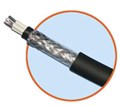Nexans Launches Low Temperature Cable ICEFLEX

Nexans, the worldwide leader in the cable industry, has launched ICEFLEX, the world's first marine and offshore full range cable qualified for extremely low temperatures such as those experienced in the Arctic. This range of cable, which is intended for use in a wide variety of shipboard and offshore/onshore applications, remains highly flexible at temperatures as low as –50°C, while ensuring advanced fire performance.
Normally cables with conventional insulation become stiff and brittle in intense cold, which can be problematic especially in places such as the Arctic. To address this problem, Nexans has developed ICEFLEX, featuring a special material that enables the cable to stay flexible at low temperatures. This makes it ideal to support the growing number of oil & gas projects taking place in the Arctic.
ICEFLEX adheres to all current environmental and safety standards, and the cable is able to meet the challenge of severe cold or ice storms. It operates reliably in icy, snowy conditions under a variety of technical applications, and can survive in exposed conditions onboard, topside or in frozen ground or permafrost. The cable also easily adapts to abrupt temperature variations such as those taking place during Spring and Autumn.
ICEFLEX is available in two versions – Halogen-Free Flame & Fire Retardant (HFFR) and halogenated versions. The cables do not propagate smoke, fire, or generate toxic gases and maintain power supplies for vital safety equipment, such as emergency lighting, fire pumps, or communications circuits.
Furthermore, both are widely specified in shipbuilding and the oil & gas industry, and are fully certified by Lloyds Register. ICEFLEX is also mechanically tough, which makes it resistant to atmospheric agents (ozone, UV, heat, etc.), and deterioration from oil, chemicals, heat and extreme weather.
ICEFLEX also has a high impact-resistance, which means it won't crack or break when subjected to sustained or violent physical shocks, such as vibration or operational stress. Salvatore Di Giorgio, Nexans Global Segment Manager for Shipbuilding and Offshore Top Side market, says: "The ability to withstand these environmental constraints is a major technical achievement, which will make it easier to safely develop Oil & Gas fields, shipping routes and processing plants in the High Arctic."
SOURCE: Nexans
